
In future, even less food is to end up in the bin. To this end, the Federal Minister of Food and Agriculture, Cem Özdemir, has agreed a pact with retailers to combat food waste. REWE Group is also involved. We spoke to Mirka Stark, Head of Strategy and Projects in the area of Sustainability.
By joining the "Pact against Food Waste", we are further strengthening our long-standing commitment to combating food waste. In doing so, we are committing to further reducing the amount of food left over despite our already extensive cooperation with food banks and foodsharing: by 30 per cent by 2025 and by 50 per cent by 2030.
"We expressly welcome the pact initiated by Federal Minister of Agriculture Cem Özdemir. Even though we have built up a very effective system in the fight against food waste over decades, we want to optimise it further. We will continue to reduce the remaining quantities primarily by expanding our cooperation with food banks and similar organisations. This is an ambitious goal in view of an average sales rate of 98 per cent and the already very high cooperation density of our REWE and PENNY stores," explained Dr Daniela Büchel, Member of the Management Board of REWE Group - Human Resources and Sustainability. But REWE Group is not resting on its laurels: "We are fighting for every single product that doesn't end up in the bin."
To this end, food that can no longer be sold but can still be consumed without hesitation has been provided free of charge by REWE since 1996 and by PENNY since 2007 to the more than 960 local food bank initiatives throughout Germany. We also work together with the foodsharing association throughout Germany.
So what else can we do? We spoke to Mirka Stark, Head of Strategy and Projects in the Sustainability department, about this.
 Mirka Stark
Mirka Stark
"We are ready to set ourselves ambitious goals"
one: At REWE Group, we have had numerous initiatives against food waste for many years. Why this pact now?
Mirka Stark: In 2019, the Federal Ministry of Agriculture set up sector-specific dialogue forums as part of the "National Strategy to Reduce Food Waste": Expert groups from practice and science have jointly identified the relevant levers for reducing food waste and derived measures. As part of the "Wholesale and Retail" dialogue forum, we were thus actively involved with REWE and PENNY in the development of the "Pact against Food Waste". We are delighted that this contribution and the signing of the voluntary commitment have once again demonstrated that the issue of food waste is very important to us as a food retailer and that we are prepared to set ourselves ambitious targets in this area.
one: The aim now is to reduce residual quantities even further: by 30 per cent by 2025 and by 50 per cent by 2030. What will we do specifically to achieve this?
Mirka Stark: We are already selling up to 98 per cent of our food. We are constantly working on optimising our forecasting systems and using automated ordering processes to supply the stores in line with demand as the technology becomes available. We are also pushing the sale of goods with a short best-before date by offering discounts. This leaves two per cent of food that is no longer sold but can still be consumed without hesitation for the most part. We make a large proportion of this available free of charge to the more than 960 local food banks across Germany, as well as to organisations such as Foodsharing. This is where we continue to work: Co-operation coverage is being continuously expanded at PENNY and REWE - for this we also need the support of our colleagues in the stores. It is important that the food banks, with their important contribution to society, are always prioritised.
one: What potential lies in informing customers? Many people still think that the best-before date is an expiry date.
Mirka Stark: Educating customers is a very important lever in reducing food waste: around 60 per cent of food waste occurs in private households. We see it as our responsibility to inform our customers about the issue and show them that food does not automatically have to be thrown away when it reaches its best-before date. For example, as part of the "Save precious things" consumer campaign, we have been labelling our dairy products at PENNY since 2019 with the words "Smell. Taste. Savour." in the immediate vicinity of the best-before date. This is intended to encourage customers to check the food for themselves and then decide whether they want to eat it.
What REWE and PENNY are doing
against food waste:
- Avoidance of food waste thanks to intelligent merchandise management systems, short transport routes and seamless refrigeration
- Regular training for employees
- Market-specific control intervals for the best-before dates of products
- Food (especially fresh meat and dairy products) that will reach their best-before date in a few days are offered at a price reduction of up to 30 per cent
- Reduction in the quantity and selection of unpackaged convenience foods in self-service counters shortly before closing time
- PENNY's own-brand dairy products are labelled with a clear warning that they may still be edible after the best-before date. Many customers are often unaware that the best-before date does not mean that a product is no longer edible one day later - it is not an expiry date
- PENNY also offers organic fruit and vegetables with minor blemishes under its own Naturgut Bio-Helden brand to raise awareness of the need to value food more highly
- Cooperation with the Tafel initiative and foodsharing

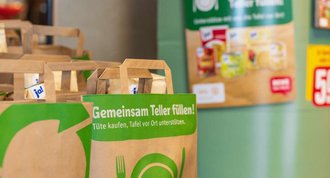
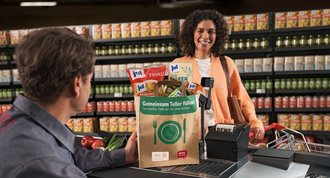

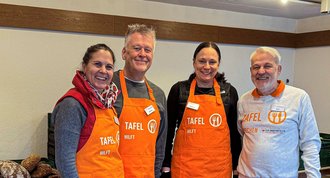
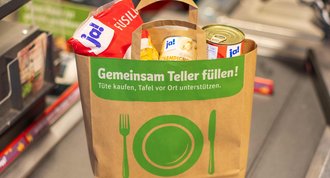

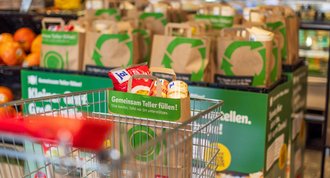
Both German and English comments appear here.
For example, I always take the lettuce that looks the most limp to save it from spoiling. Soaking it overnight in cold (not hot!) water means it's fit again the next morning. Rummaging around for the last product on the shelf is also counterproductive, but unfortunately this can often be observed. REWE could start a campaign against this.
Hi everyone, I also think it is exemplary of our company to continue to drive this issue forward. In my opinion, perhaps somewhat subjectively, REWE was and is one of the pioneers here among the major food companies. Of course, the pact continues to motivate us, but hopefully also the other big players. I fear that the small, independent food retailers who don't run under the big flag will either continue to be unaware of the pact or won't be able to invest time and effort here with their small business. But also with regard to Silke's question, a not new idea would be that food that has passed its best-before date and therefore can't be passed on to the food banks doesn't end up directly in the rubbish bin, but can be taken away free of charge in a separate area. Of course with the legal safeguard that you are no longer liable for these products.
It's great that we're setting ourselves such ambitious goals here. I wonder if we could also "announce" that the rubbish containers at REWE and PENNY are not locked and easily accessible and that no charges are brought when containers are dumped at night to make this possible, so to speak, although it is still not legal. Unfortunately, certain foods are no longer allowed to be given to food banks, even though they are still edible.